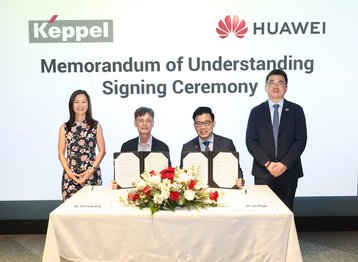Huawei and Keppel have signed a Memorandum of Understanding (MoU) to develop solar and battery energy storage system (BESS) projects for the data center and other high-energy-consuming sectors, initially focusing on the ASEAN region.
Keppel x Huawei MOU Signing Ceremony Image for Press Release
– Keppel
The MoU will see the companies explore the design and development of ‘innovative’ solar and BESS technologies deployed across various sectors, including data centers and transmission grids. The companies claim that the solutions will reduce carbon emissions, improve operational stability, and lower lifecycle costs.
Projects under this partnership will be linked to Keppel’s Operations Nerve Centre in Singapore, which uses artificial intelligence and machine learning for real-time monitoring and optimization.
In Singapore, the two companies are also working on a demand response program using a BESS at Keppel Infrastructure @ Changi, aimed at improving the performance and efficiency of renewable assets.
“Our collaboration with Keppel is a bold but committed step forward in addressing the urgent need for sustainable energy solutions,” said Maxi Wang, CEO of Huawei International. “We are reshaping the future of energy innovation.”
Cindy Lim, CEO of Keppel’s Infrastructure Division, added: “Energy storage is essential to overcoming the intermittency of renewable energy systems. Through this partnership, we aim to enhance the reliability and seamless integration of renewables with state-of-the-art energy storage.”
Beyond local initiatives, Huawei and Keppel plan to co-develop strategies to expand renewable energy solutions to other regions. The companies say the partnership supports Singapore’s Green Plan 2030 by promoting clean energy and energy efficiency, though the developments are not expected to have a material impact on Keppel’s earnings for the current financial year.
The MoU is Keppel’s second this year that focuses on the upscaling of renewable and low-carbon technologies.
In March, the company signed an MoU with the Japan Bank for International Cooperation (JBIC) to establish a clean energy supply chain across Asia to support the energy transition and sustainable digitalization in the region.
The company has a robust data center portfolio across the ASEAN region, including around 200MW of capacity in Singapore, 350MW across the rest of APAC (Australia, Japan, China, and Malaysia), in addition to a further 100MW of capacity in Europe.
In April, the firm closed its third data center fund, raising approximately S$786 million (US$580m) in initial capital commitments. The company said the fund will focus on securing pre-commitment or high leasing certainty from hyperscale customers to mitigate risk to investors.






